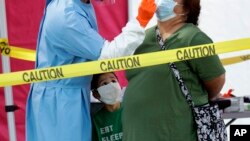There are currently no known vaccines for COVID-19 but fighting over those that might be produced has begun.
French pharmaceutical giant Sanofi has denied promising the United States priority access to its potential COVID-19 vaccine. French Prime Minister Edouard Philippe insisted Thursday that the access to any vaccine produced by the French company would be equal for all.
The remarks came after Sanofi CEO Paul Hudson told Bloomberg News that the U.S. government had "the right to the largest preorder because it has invested in taking the risk." The French company has plants in the United States, but most of them are in Europe.
Sanofi Chairman Serge Weinberg told France 2 television that “there will be no particular advance given to any country.”
In a similar controversy in March, the German public and the government reacted angrily to reports that U.S. President Donald Trump had allegedly offered German biopharmaceutical company CureVac $1 billion to secure the vaccine exclusively for the United States.
German foreign minister Heiko Maas said at the time that German scientists were working to develop a COVID-19 vaccine as part of global cooperation.
“We cannot allow a situation where others want to exclusively acquire the results. of their research,” Maas said.
U.S. officials responded that the report had been exaggerated and that the U.S. government had talked to a number of pharmaceutical companies worldwide that are working on cure for COVID-19. An official said most of those companies had received some initial funding from U.S. investors.
French President Emmanuel Macron intervened Thursday and said that a potential COVID-19 vaccine should not be subject to market forces and that he will address the issue with top Sanofi officials next week.
A group of 140 current and former world leaders, experts and eminent citizens from around the world have published an open letter calling for a patent-free vaccine that would be made available at no cost to people everywhere.
The stormy reactions reflect growing displeasure with pharmaceutical companies that seek to make a profit from people whose health and even whose lives are at stake.
The number of COVID-19 cases worldwide approached 4.5 million Thursday, with more than 300,000 recorded deaths.
About 100 organizations worldwide are working on developing a coronavirus vaccine.
Experts say that if a successful vaccine were found, producing enough to meet the immediate global demand would require a massive effort. Health officials warn of a new and possibly more deadly wave of COVID-19 infections in the fall.
The Trump administration has been rejecting accusations that it ignored the outbreak during the crucial first few weeks and attempted to shift some of the blame onto the previous administration. The president has often been at odds with his own health officials, including the government’s chief infectious disease expert, Anthony Fauci, regarding the danger posed by the coronavirus.
On Thursday another U.S. government health official told a congressional hearing that he had been removed from his post for raising concerns about U.S. preparedness for the coronavirus. Rick Bright, former director of the Biomedical Advanced Research and Development Authority (BARDA), which is a part of the U.S. Department of Health and Human Services, told a House panel that the United States could face “the darkest winter” of recent times if it does not improve its response to the pandemic.
Before the hearing, Trump called Bright a “disgruntled employee” who should no longer work for the government.
The United States leads the world with the highest number of COVID-19 cases. More than 1.4 million people in the country have been infected and close to 86,000 have died, according to the Johns Hopkins University tally. The outbreak has ravaged the economy and led to the highest unemployment in the history of the U.S.
The World Health Organization has warned that the coronavirus may become endemic, like HIV, even if a vaccine is found, and that communities must find ways to live with it.
In addition to causing respiratory problems, the coronavirus pandemic has affected many people’s mental health as they worry about their financial future and live in prolonged isolation.






